Warmouth Surname Ancestry ResultsOur indexes 1000-1999 include entries for the spelling 'warmouth'. In the period you have requested, we have the following 11 records (displaying 1 to 10): Buy all | | | Get all 11 records to view, to save and print for £52.00 |
These sample scans are from the original record. You will get scans of the full pages or articles where the surname you searched for has been found. Your web browser may prevent the sample windows from opening; in this case please change your browser settings to allow pop-up windows from this site. Secretary of State's Papers
(1598)
The letters and papers of sir Robert Cecil, Secretary of State, deal with all manner of government business in England, Ireland and abroad.WARMOUTH. Cost: £4.00.  | Sample scan, click to enlarge
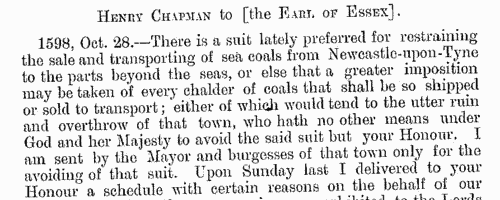
| Quarter Sessions for the North Riding of Yorkshire
(1605-1612)
The Quarter Sessions minute books for the North Riding from April 1605 to July 1612 were edited by the Rev. J. C. Atkinson for the North Riding Record Society and published in 1884. This is a calendar of sessional orders, minutes of criminal cases, memoranda and other entries of record concerning the administration of the riding, for the quarter sessions and special sessions held at Thirsk, Stokesley, Richmond, Malton, Helmsley, Northallerton and Topcliffe. Recusants (persons refusing or neglecting to attend parish church services) are listed in the summary of prosecutions on pages 4-5, 10, 17, 21, 42, 55-56, 61, 65, 69, 72, 79, 82, 95, 99, 113-115, 122, 131, 153-155 and 176. WARMOUTH. Cost: £4.00.  | Sample scan, click to enlarge
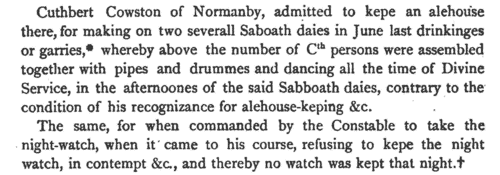
| Liegemen and Traitors, Pirates and Spies
(1616-1617)
The Privy Council of James I was responsible for internal security in England and Wales, and dealt with all manner of special and urgent matters
WARMOUTH. Cost: £4.00.  | Sample scan, click to enlarge
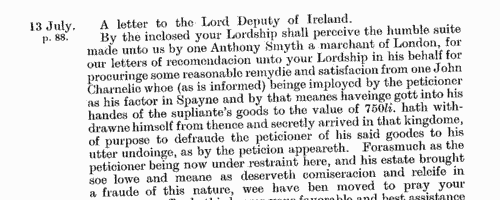
| Liegemen and Traitors, Pirates and Spies
(1625-1626)
The Privy Council of Charles I was responsible for internal security in England and Wales, and dealt with all manner of special and urgent matters
WARMOUTH. Cost: £4.00.  | Sample scan, click to enlarge

| Liegemen and Traitors, Pirates and Spies
(1626)
The Privy Council of Charles I was responsible for internal security in England and Wales, and dealt with all manner of special and urgent matters
WARMOUTH. Cost: £4.00.  | Sample scan, click to enlarge
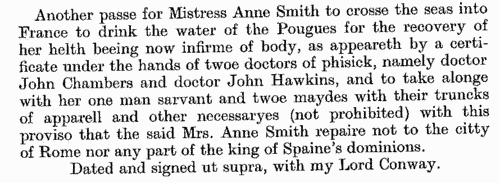
| Official Papers
(1645-1647)
The State Papers Domestic are the main series of records of internal British administration for this period. The volumes printed in abstract here (Charles I dx to dxv) run from July 1645 to December 1647, a period of defeat of royal power by the parliamentary forces. Parliament's victory at Naseby in June 1645 led to the collapse of the Royalist cause and the imprisonment of the king in Carisbrooke Castle towards the close of 1647. During all these events the administration of government continued, largely using the same institutions, leaving similar series of records as before: but executive power is now represented in these books by the Committee of Both Kingdoms (England and Scotland). The State Papers Domestic for these years are largely concerned with the prosecution of hostilities, the movements and supply of troops, and the treatment of 'delinquents'. Chronologically interleaved with the abstracts of the main volumes are details from the series of Proceedings of the Committee of Both Kingdoms, but these are lost for the years 1646 to 1647, brief notes only surviving in the Indexes to the Day Book of Orders. There are also appendices relating to the victualling and disposition of the Navy, taken from the Letters and Papers of the Committee for the Admiralty and the Committe of the Navy, which also include some petitions from sailors, victuallers, officials, or their dependants, seeking redress or relief.WARMOUTH. Cost: £4.00.  | Sample scan, click to enlarge
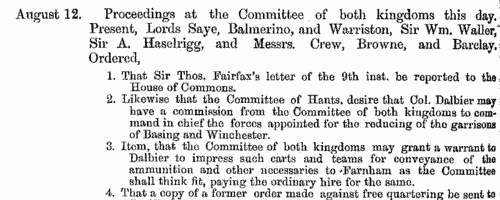
| Royalist delinquents in county Durham and Northumberland, their successors, tenants, debtors and creditors
(1648-1660)
King Charles I was executed 30 January 1649, the kingship was abolished and government by a Council of State was established 14 February 1649. Oliver Cromwell became Lord Protector 16 December 1653; died 3 September 1658; and was succeeded by his son Richard, who abdicated 24 May 1659. Charles II was established on the throne 29 May 1660. From 1648 to 1660 parliament sequestrated royalists' estates, restoring many by a process of heavy fines called compounding; this was administered by the Committee for Compounding, working through county committees. These raised considerable amounts of money, money which was vitally necessary for maintaining the parliamentary army's campaigns to subdue opposition in the three kingdoms - England, Scotland and Ireland. The raising and delivery of these monies was the responsibility of the Committee for Advance of Money (C. A. M.). The records of these committees were detailed and extensive, amounting to about 300 volumes, and were calendared for the Public Record Office by Mary Anne Everett Green. Abstracts of the county Durham and Northumberland entries were collated by Richard Welford with a manuscript transcript of the proceedings of the parliamentary commissioners in county Durham surviving in Durham cathedral library, and published by the Surtees Society in 1905. The persons named in these abstracts are not only the delinquents themselves, and those who succeeded them in their estates, but tenants, debtors and creditors, and local constables and officials of the committees.WARMOUTH. Cost: £4.00.  | Sample scan, click to enlarge

|  Masters of Apprentices registered in Somerset
(1741-1745) Masters of Apprentices registered in Somerset
(1741-1745)
Apprenticeship indentures and clerks' articles were subject to a 6d or 12d per pound stamp duty: the registers of the payments usually give the master's trade, address, and occupation, and the apprentice's father's name and address, as well as details of the date and length of the apprenticeship. There are central registers for collections of the stamp duty in London, as well as returns from collectors in the provinces. These collectors generally received duty just from their own county, but sometimes from further afield. (The sample entry shown on this scan is taken from a Norfolk return)WARMOUTH. Cost: £8.00.  | Sample scan, click to enlarge

|  Masters and Apprentices
(1746) Masters and Apprentices
(1746)
Apprenticeship indentures and clerks' articles were subject to a 6d or 12d per pound stamp duty: the registers of the payments usually give the master's trade, address, and occupation, and the apprentice's father's name and address, as well as details of the date and length of the apprenticeship. 1 January to 3 October 1746WARMOUTH. Cost: £8.00.  | Sample scan, click to enlarge

| Merchants and traders in Newcastle-upon-Tyne
(1480-1770)
The society of Merchant Adventurers of Newcastle-upon-Tyne consisted of those who had obtained freedom of the city (allowing them to trade there) by birth as a son of, or apprenticeship, to a freeman: and within that, freedom of one of the three 'trades', i. e. boothman, draper or mercer. F. W. Dendy prepared extracts from the merchant adventurers' records, the first volume, published by the Surtees Society in 1895, containing extracts from the ordinances of the society through to 1894, the great majority being, however, from the 16th to 18th centuries. The Merchants' Company was founded with a series of enactments for their guidance and governance. But Dendy remarks that "Experience soon convinced them of the need of other laws, and these were framed from time to time. But during a very considerable period the members of the Society seem to have been influenced by a love of legislating, and their bye-laws increased to an unnecessary and perplexing extent." Indeed, many of the later ordinances amount to no more than minutes of particular orders aimed at particular people. WARMOUTH. Cost: £4.00.  | Sample scan, click to enlarge

|
| 1 | 2 |  |
Research your ancestry, family history, genealogy and one-name study by direct access to original records and archives indexed by surname.
|













